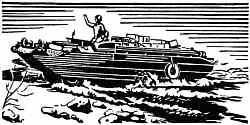|
|
|
13. Orukter Amphibolos
A Radio Talk by Charles F. Kettering
Once in awhile, someone makes a prophecy that
comes true with remarkable accuracy many years later. Tennyson,
over 100 years ago in the poem "Locksley Hall," described "The nations'
airy navies grappling in the central blue," and Jules Verne had written
"Around The World in 80 Days." These men used their imaginations -
but their concepts were not factual enough to include things as they
are actually happening today. These ideas or predictions though
very interesting, usually have to wait a long time until some practical
man can give them a physical form. The first concept of an idea is
one thing - the working model is another, and as every inventor knows,
popular acceptance - still another.
 But occasionally we see a fine example of a man's practical
thinking that was a century or more ahead of industry. As a case in
point, let us take that military vehicle called the "Duck." This unique
land and water conveyance has been developed during this war to
make possible invasion of enemy territory. Its versatility lies in the
fact that it can leave a ship offshore and travel through the water as
a boat. Upon reaching the land, it goes ashore and continues its course
as a truck - it can go from land to sea just as easily.
But occasionally we see a fine example of a man's practical
thinking that was a century or more ahead of industry. As a case in
point, let us take that military vehicle called the "Duck." This unique
land and water conveyance has been developed during this war to
make possible invasion of enemy territory. Its versatility lies in the
fact that it can leave a ship offshore and travel through the water as
a boat. Upon reaching the land, it goes ashore and continues its course
as a truck - it can go from land to sea just as easily.
Recently, in Philadelphia, thousands of people
lined Market Street
and the banks of the Schuylkill River to watch a "Duck" travel along
the street, slide into the water and proceed up the river. It was an
amazing demonstration.
|
|


 But occasionally we see a fine example of a man's practical
thinking that was a century or more ahead of industry. As a case in
point, let us take that military vehicle called the "Duck." This unique
land and water conveyance has been developed during this war to
make possible invasion of enemy territory. Its versatility lies in the
fact that it can leave a ship offshore and travel through the water as
a boat. Upon reaching the land, it goes ashore and continues its course
as a truck - it can go from land to sea just as easily.
But occasionally we see a fine example of a man's practical
thinking that was a century or more ahead of industry. As a case in
point, let us take that military vehicle called the "Duck." This unique
land and water conveyance has been developed during this war to
make possible invasion of enemy territory. Its versatility lies in the
fact that it can leave a ship offshore and travel through the water as
a boat. Upon reaching the land, it goes ashore and continues its course
as a truck - it can go from land to sea just as easily.





